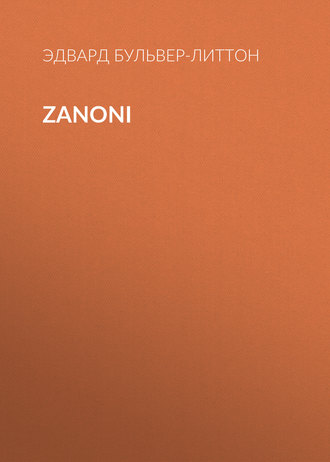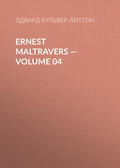
Эдвард Бульвер-Литтон
Zanoni
“Your Excellency was not, perhaps, prepared for the hearty welcome we have given you.”
“Why, in truth, I OUGHT to have been prepared for it, since the signor, to whose house I am bound, did not disguise from me the character of the neighbourhood. And your name, my friend, if I may so call you?”
“Oh, no ceremonies with me, Excellency. In the village I am generally called Maestro Paolo. I had a surname once, though a very equivocal one; and I have forgotten THAT since I retired from the world.”
“And was it from disgust, from poverty, or from some—some ebullition of passion which entailed punishment, that you betook yourself to the mountains?”
“Why, signor,” said the bravo, with a gay laugh, “hermits of my class seldom love the confessional. However, I have no secrets while my step is in these defiles, my whistle in my pouch, and my carbine at my back.” With that the robber, as if he loved permission to talk at his will, hemmed thrice, and began with much humour; though, as his tale proceeded, the memories it roused seemed to carry him farther than he at first intended, and reckless and light-hearted ease gave way to that fierce and varied play of countenance and passion of gesture which characterise the emotions of his countrymen.
“I was born at Terracina,—a fair spot, is it not? My father was a learned monk of high birth; my mother—Heaven rest her!—an innkeeper’s pretty daughter. Of course there could be no marriage in the case; and when I was born, the monk gravely declared my appearance to be miraculous. I was dedicated from my cradle to the altar; and my head was universally declared to be the orthodox shape for a cowl. As I grew up, the monk took great pains with my education; and I learned Latin and psalmody as soon as less miraculous infants learn crowing. Nor did the holy man’s care stint itself to my interior accomplishments. Although vowed to poverty, he always contrived that my mother should have her pockets full; and between her pockets and mine there was soon established a clandestine communication; accordingly, at fourteen, I wore my cap on one side, stuck pistols in my belt, and assumed the swagger of a cavalier and a gallant. At that age my poor mother died; and about the same period my father, having written a History of the Pontifical Bulls, in forty volumes, and being, as I said, of high birth, obtained a cardinal’s hat. From that time he thought fit to disown your humble servant. He bound me over to an honest notary at Naples, and gave me two hundred crowns by way of provision. Well, signor, I saw enough of the law to convince me that I should never be rogue enough to shine in the profession. So, instead of spoiling parchment, I made love to the notary’s daughter. My master discovered our innocent amusement, and turned me out of doors; that was disagreeable. But my Ninetta loved me, and took care that I should not lie out in the streets with the Lazzaroni. Little jade! I think I see her now with her bare feet, and her finger to her lips, opening the door in the summer nights, and bidding me creep softly into the kitchen, where, praised be the saints! a flask and a manchet always awaited the hungry amoroso. At last, however, Ninetta grew cold. It is the way of the sex, signor. Her father found her an excellent marriage in the person of a withered old picture-dealer. She took the spouse, and very properly clapped the door in the face of the lover. I was not disheartened, Excellency; no, not I. Women are plentiful while we are young. So, without a ducat in my pocket or a crust for my teeth, I set out to seek my fortune on board of a Spanish merchantman. That was duller work than I expected; but luckily we were attacked by a pirate,—half the crew were butchered, the rest captured. I was one of the last: always in luck, you see, signor,—monks’ sons have a knack that way! The captain of the pirates took a fancy to me. ‘Serve with us?’ said he. ‘Too happy,’ said I. Behold me, then, a pirate! O jolly life! how I blessed the old notary for turning me out of doors! What feasting, what fighting, what wooing, what quarrelling! Sometimes we ran ashore and enjoyed ourselves like princes; sometimes we lay in a calm for days together on the loveliest sea that man ever traversed. And then, if the breeze rose and a sail came in sight, who so merry as we? I passed three years in that charming profession, and then, signor, I grew ambitious. I caballed against the captain; I wanted his post. One still night we struck the blow. The ship was like a log in the sea, no land to be seen from the mast-head, the waves like glass, and the moon at its full. Up we rose, thirty of us and more. Up we rose with a shout; we poured into the captain’s cabin, I at the head. The brave old boy had caught the alarm, and there he stood at the doorway, a pistol in each hand; and his one eye (he had only one) worse to meet than the pistols were.
“‘Yield!’ cried I; ‘your life shall be safe.’
“‘Take that,’ said he, and whiz went the pistol; but the saints took care of their own, and the ball passed by my cheek, and shot the boatswain behind me. I closed with the captain, and the other pistol went off without mischief in the struggle. Such a fellow he was,—six feet four without his shoes! Over we went, rolling each on the other. Santa Maria! no time to get hold of one’s knife. Meanwhile all the crew were up, some for the captain, some for me,—clashing and firing, and swearing and groaning, and now and then a heavy splash in the sea. Fine supper for the sharks that night! At last old Bilboa got uppermost; out flashed his knife; down it came, but not in my heart. No! I gave my left arm as a shield; and the blade went through to the hilt, with the blood spurting up like the rain from a whale’s nostril! With the weight of the blow the stout fellow came down so that his face touched mine; with my right hand I caught him by the throat, turned him over like a lamb, signor, and faith it was soon all up with him: the boatswain’s brother, a fat Dutchman, ran him through with a pike.
“‘Old fellow,’ said I, as he turned his terrible eye to me, ‘I bear you no malice, but we must try to get on in the world, you know.’ The captain grinned and gave up the ghost. I went upon deck,—what a sight! Twenty bold fellows stark and cold, and the moon sparkling on the puddles of blood as calmly as if it were water. Well, signor, the victory was ours, and the ship mine; I ruled merrily enough for six months. We then attacked a French ship twice our size; what sport it was! And we had not had a good fight so long, we were quite like virgins at it! We got the best of it, and won ship and cargo. They wanted to pistol the captain, but that was against my laws: so we gagged him, for he scolded as loud as if we were married to him; left him and the rest of his crew on board our own vessel, which was terribly battered; clapped our black flag on the Frenchman’s, and set off merrily, with a brisk wind in our favour. But luck deserted us on forsaking our own dear old ship. A storm came on, a plank struck; several of us escaped in a boat; we had lots of gold with us, but no water. For two days and two nights we suffered horribly; but at last we ran ashore near a French seaport. Our sorry plight moved compassion, and as we had money, we were not suspected,—people only suspect the poor. Here we soon recovered our fatigues, rigged ourselves out gayly, and your humble servant was considered as noble a captain as ever walked deck. But now, alas! my fate would have it that I should fall in love with a silk-mercer’s daughter. Ah, how I loved her!—the pretty Clara! Yes, I loved her so well that I was seized with horror at my past life! I resolved to repent, to marry her, and settle down into an honest man. Accordingly, I summoned my messmates, told them my resolution, resigned my command, and persuaded them to depart. They were good fellows, engaged with a Dutchman, against whom I heard afterwards they made a successful mutiny, but I never saw them more. I had two thousand crowns still left; with this sum I obtained the consent of the silk-mercer, and it was agreed that I should become a partner in the firm. I need not say that no one suspected that I had been so great a man, and I passed for a Neapolitan goldsmith’s son instead of a cardinal’s. I was very happy then, signor, very,—I could not have harmed a fly! Had I married Clara, I had been as gentle a mercer as ever handled a measure.”
The bravo paused a moment, and it was easy to see that he felt more than his words and tone betokened. “Well, well, we must not look back at the past too earnestly,—the sunlight upon it makes one’s eyes water. The day was fixed for our wedding,—it approached. On the evening before the appointed day, Clara, her mother, her little sister, and myself, were walking by the port; and as we looked on the sea, I was telling them old gossip-tales of mermaids and sea-serpents, when a red-faced, bottle-nosed Frenchman clapped himself right before me, and, placing his spectacles very deliberately astride his proboscis, echoed out, ‘Sacre, mille tonnerres! this is the damned pirate who boarded the “Niobe”!’”
“‘None of your jests,’ said I, mildly. ‘Ho, ho!’ said he; ‘I can’t be mistaken; help there!’ and he griped me by the collar. I replied, as you may suppose, by laying him in the kennel; but it would not do. The French captain had a French lieutenant at his back, whose memory was as good as his chief’s. A crowd assembled; other sailors came up: the odds were against me. I slept that night in prison; and in a few weeks afterwards I was sent to the galleys. They spared my life, because the old Frenchman politely averred that I had made my crew spare his. You may believe that the oar and the chain were not to my taste. I and two others escaped; they took to the road, and have, no doubt, been long since broken on the wheel. I, soft soul, would not commit another crime to gain my bread, for Clara was still at my heart with her sweet eyes; so, limiting my rogueries to the theft of a beggar’s rags, which I compensated by leaving him my galley attire instead, I begged my way to the town where I left Clara. It was a clear winter’s day when I approached the outskirts of the town. I had no fear of detection, for my beard and hair were as good as a mask. Oh, Mother of Mercy! there came across my way a funeral procession! There, now you know it; I can tell you no more. She had died, perhaps of love, more likely of shame. Can you guess how I spent that night?—I stole a pickaxe from a mason’s shed, and all alone and unseen, under the frosty heavens, I dug the fresh mould from the grave; I lifted the coffin, I wrenched the lid, I saw her again—again! Decay had not touched her. She was always pale in life! I could have sworn she lived! It was a blessed thing to see her once more, and all alone too! But then, at dawn, to give her back to the earth,—to close the lid, to throw down the mould, to hear the pebbles rattle on the coffin: that was dreadful! Signor, I never knew before, and I don’t wish to think now, how valuable a thing human life is. At sunrise I was again a wanderer; but now that Clara was gone, my scruples vanished, and again I was at war with my betters. I contrived at last, at O—, to get taken on board a vessel bound to Leghorn, working out my passage. From Leghorn I went to Rome, and stationed myself at the door of the cardinal’s palace. Out he came, his gilded coach at the gate.
“‘Ho, father!’ said I; ‘don’t you know me?’
“‘Who are you?’
“‘Your son,’ said I, in a whisper.
“The cardinal drew back, looked at me earnestly, and mused a moment. ‘All men are my sons,’ quoth he then, very mildly; ‘there is gold for thee! To him who begs once, alms are due; to him who begs twice, jails are open. Take the hint and molest me no more. Heaven bless thee!’ With that he got into his coach, and drove off to the Vatican. His purse which he had left behind was well supplied. I was grateful and contented, and took my way to Terracina. I had not long passed the marshes when I saw two horsemen approach at a canter.
“‘You look poor, friend,’ said one of them, halting; ‘yet you are strong.’
“‘Poor men and strong are both serviceable and dangerous, Signor Cavalier.’
“‘Well said; follow us.’
“I obeyed, and became a bandit. I rose by degrees; and as I have always been mild in my calling, and have taken purses without cutting throats, I bear an excellent character, and can eat my macaroni at Naples without any danger to life and limb. For the last two years I have settled in these parts, where I hold sway, and where I have purchased land. I am called a farmer, signor; and I myself now only rob for amusement, and to keep my hand in. I trust I have satisfied your curiosity. We are within a hundred yards of the castle.”
“And how,” asked the Englishman, whose interest had been much excited by his companion’s narrative,—“and how came you acquainted with my host?—and by what means has he so well conciliated the goodwill of yourself and friends?”
Maestro Paolo turned his black eyes very gravely towards his questioner. “Why, signor,” said he, “you must surely know more of the foreign cavalier with the hard name than I do. All I can say is, that about a fortnight ago I chanced to be standing by a booth in the Toledo at Naples, when a sober-looking gentleman touched me by the arm, and said, ‘Maestro Paolo, I want to make your acquaintance; do me the favour to come into yonder tavern, and drink a flask of lacrima.’ ‘Willingly,’ said I. So we entered the tavern. When we were seated, my new acquaintance thus accosted me: ‘The Count d’O— has offered to let me hire his old castle near B—. You know the spot?’
“‘Extremely well; no one has inhabited it for a century at least; it is half in ruins, signor. A queer place to hire; I hope the rent is not heavy.’
“‘Maestro Paolo,’ said he, ‘I am a philosopher, and don’t care for luxuries. I want a quiet retreat for some scientific experiments. The castle will suit me very well, provided you will accept me as a neighbour, and place me and my friends under your special protection. I am rich; but I shall take nothing to the castle worth robbing. I will pay one rent to the count, and another to you.’
“With that we soon came to terms; and as the strange signor doubled the sum I myself proposed, he is in high favour with all his neighbours. We would guard the whole castle against an army. And now, signor, that I have been thus frank, be frank with me. Who is this singular cavalier?”
“Who?—he himself told you, a philosopher.”
“Hem! searching for the Philosopher’s Stone,—eh, a bit of a magician; afraid of the priests?”
“Precisely; you have hit it.”
“I thought so; and you are his pupil?”
“I am.”
“I wish you well through it,” said the robber, seriously, and crossing himself with much devotion; “I am not much better than other people, but one’s soul is one’s soul. I do not mind a little honest robbery, or knocking a man on the head if need be,—but to make a bargain with the devil! Ah, take care, young gentleman, take care!”
“You need not fear,” said Glyndon, smiling; “my preceptor is too wise and too good for such a compact. But here we are, I suppose. A noble ruin,—a glorious prospect!”
Glyndon paused delightedly, and surveyed the scene before and below with the eye of a painter. Insensibly, while listening to the bandit, he had wound up a considerable ascent, and now he was upon a broad ledge of rock covered with mosses and dwarf shrubs. Between this eminence and another of equal height, upon which the castle was built, there was a deep but narrow fissure, overgrown with the most profuse foliage, so that the eye could not penetrate many yards below the rugged surface of the abyss; but the profoundness might be well conjectured by the hoarse, low, monotonous roar of waters unseen that rolled below, and the subsequent course of which was visible at a distance in a perturbed and rapid stream that intersected the waste and desolate valleys.
To the left, the prospect seemed almost boundless,—the extreme clearness of the purple air serving to render distinct the features of a range of country that a conqueror of old might have deemed in itself a kingdom. Lonely and desolate as the road which Glyndon had passed that day had appeared, the landscape now seemed studded with castles, spires, and villages. Afar off, Naples gleamed whitely in the last rays of the sun, and the rose-tints of the horizon melted into the azure of her glorious bay. Yet more remote, and in another part of the prospect, might be caught, dim and shadowy, and backed by the darkest foliage, the ruined pillars of the ancient Posidonia. There, in the midst of his blackened and sterile realms, rose the dismal Mount of Fire; while on the other hand, winding through variegated plains, to which distance lent all its magic, glittered many and many a stream by which Etruscan and Sybarite, Roman and Saracen and Norman had, at intervals of ages, pitched the invading tent. All the visions of the past—the stormy and dazzling histories of Southern Italy—rushed over the artist’s mind as he gazed below. And then, slowly turning to look behind, he saw the grey and mouldering walls of the castle in which he sought the secrets that were to give to hope in the future a mightier empire than memory owns in the past. It was one of those baronial fortresses with which Italy was studded in the earlier middle ages, having but little of the Gothic grace or grandeur which belongs to the ecclesiastical architecture of the same time, but rude, vast, and menacing, even in decay. A wooden bridge was thrown over the chasm, wide enough to admit two horsemen abreast; and the planks trembled and gave back a hollow sound as Glyndon urged his jaded steed across.
A road which had once been broad and paved with rough flags, but which now was half-obliterated by long grass and rank weeds, conducted to the outer court of the castle hard by; the gates were open, and half the building in this part was dismantled; the ruins partially hid by ivy that was the growth of centuries. But on entering the inner court, Glyndon was not sorry to notice that there was less appearance of neglect and decay; some wild roses gave a smile to the grey walls, and in the centre there was a fountain in which the waters still trickled coolly, and with a pleasing murmur, from the jaws of a gigantic Triton. Here he was met by Mejnour with a smile.
“Welcome, my friend and pupil,” said he: “he who seeks for Truth can find in these solitudes an immortal Academe.”
CHAPTER 4.II
And Abaris, so far from esteeming Pythagoras, who taught these things, a necromancer or wizard, rather revered and admired him as something divine.—Iamblich., “Vit. Pythag.”
The attendants whom Mejnour had engaged for his strange abode were such as might suit a philosopher of few wants. An old Armenian whom Glyndon recognised as in the mystic’s service at Naples, a tall, hard-featured woman from the village, recommended by Maestro Paolo, and two long-haired, smooth-spoken, but fierce-visaged youths from the same place, and honoured by the same sponsorship, constituted the establishment. The rooms used by the sage were commodious and weather-proof, with some remains of ancient splendour in the faded arras that clothed the walls, and the huge tables of costly marble and elaborate carving. Glyndon’s sleeping apartment communicated with a kind of belvedere, or terrace, that commanded prospects of unrivalled beauty and extent, and was separated on the other side by a long gallery, and a flight of ten or a dozen stairs, from the private chambers of the mystic. There was about the whole place a sombre and yet not displeasing depth of repose. It suited well with the studies to which it was now to be appropriated.
For several days Mejnour refused to confer with Glyndon on the subjects nearest to his heart.
“All without,” said he, “is prepared, but not all within; your own soul must grow accustomed to the spot, and filled with the surrounding nature; for Nature is the source of all inspiration.”
With these words Mejnour turned to lighter topics. He made the Englishman accompany him in long rambles through the wild scenes around, and he smiled approvingly when the young artist gave way to the enthusiasm which their fearful beauty could not have failed to rouse in a duller breast; and then Mejnour poured forth to his wondering pupil the stores of a knowledge that seemed inexhaustible and boundless. He gave accounts the most curious, graphic, and minute of the various races (their characters, habits, creeds, and manners) by which that fair land had been successively overrun. It is true that his descriptions could not be found in books, and were unsupported by learned authorities; but he possessed the true charm of the tale-teller, and spoke of all with the animated confidence of a personal witness. Sometimes, too, he would converse upon the more durable and the loftier mysteries of Nature with an eloquence and a research which invested them with all the colours rather of poetry than science. Insensibly the young artist found himself elevated and soothed by the lore of his companion; the fever of his wild desires was slaked. His mind became more and more lulled into the divine tranquillity of contemplation; he felt himself a nobler being, and in the silence of his senses he imagined that he heard the voice of his soul.
It was to this state that Mejnour evidently sought to bring the neophyte, and in this elementary initiation the mystic was like every more ordinary sage. For he who seeks to DISCOVER must first reduce himself into a kind of abstract idealism, and be rendered up, in solemn and sweet bondage, to the faculties which CONTEMPLATE and IMAGINE.
Glyndon noticed that, in their rambles, Mejnour often paused, where the foliage was rifest, to gather some herb or flower; and this reminded him that he had seen Zanoni similarly occupied. “Can these humble children of Nature,” said he one day to Mejnour,—“things that bloom and wither in a day, be serviceable to the science of the higher secrets? Is there a pharmacy for the soul as well as the body, and do the nurslings of the summer minister not only to human health but spiritual immortality?”
“If,” answered Mejnour, “a stranger had visited a wandering tribe before one property of herbalism was known to them; if he had told the savages that the herbs which every day they trampled under foot were endowed with the most potent virtues; that one would restore to health a brother on the verge of death; that another would paralyse into idiocy their wisest sage; that a third would strike lifeless to the dust their most stalwart champion; that tears and laughter, vigour and disease, madness and reason, wakefulness and sleep, existence and dissolution, were coiled up in those unregarded leaves,—would they not have held him a sorcerer or a liar? To half the virtues of the vegetable world mankind are yet in the darkness of the savages I have supposed. There are faculties within us with which certain herbs have affinity, and over which they have power. The moly of the ancients is not all a fable.”
The apparent character of Mejnour differed in much from that of Zanoni; and while it fascinated Glyndon less, it subdued and impressed him more. The conversation of Zanoni evinced a deep and general interest for mankind,—a feeling approaching to enthusiasm for art and beauty. The stories circulated concerning his habits elevated the mystery of his life by actions of charity and beneficence. And in all this there was something genial and humane that softened the awe he created, and tended, perhaps, to raise suspicions as to the loftier secrets that he arrogated to himself. But Mejnour seemed wholly indifferent to all the actual world. If he committed no evil, he seemed equally apathetic to good. His deeds relieved no want, his words pitied no distress. What we call the heart appeared to have merged into the intellect. He moved, thought, and lived like some regular and calm abstraction, rather than one who yet retained, with the form, the feelings and sympathies of his kind.
Glyndon once, observing the tone of supreme indifference with which he spoke of those changes on the face of earth which he asserted he had witnessed, ventured to remark to him the distinction he had noted.
“It is true,” said Mejnour, coldly. “My life is the life that contemplates,—Zanoni’s is the life that enjoys: when I gather the herb, I think but of its uses; Zanoni will pause to admire its beauties.”
“And you deem your own the superior and the loftier existence?”
“No. His is the existence of youth,—mine of age. We have cultivated different faculties. Each has powers the other cannot aspire to. Those with whom he associates live better,—those who associate with me know more.”
“I have heard, in truth,” said Glyndon, “that his companions at Naples were observed to lead purer and nobler lives after intercourse with Zanoni; yet were they not strange companions, at the best, for a sage? This terrible power, too, that he exercises at will, as in the death of the Prince di —, and that of the Count Ughelli, scarcely becomes the tranquil seeker after good.”
“True,” said Mejnour, with an icy smile; “such must ever be the error of those philosophers who would meddle with the active life of mankind. You cannot serve some without injuring others; you cannot protect the good without warring on the bad; and if you desire to reform the faulty, why, you must lower yourself to live with the faulty to know their faults. Even so saith Paracelsus, a great man, though often wrong. [‘It is as necessary to know evil things as good; for who can know what is good without the knowing what is evil?’ etc.—Paracelsus, ‘De Nat. Rer.,’ lib. 3.) Not mine this folly; I live but in knowledge,—I have no life in mankind!”
Another time Glyndon questioned the mystic as to the nature of that union or fraternity to which Zanoni had once referred.
“I am right, I suppose,” said he, “in conjecturing that you and himself profess to be the brothers of the Rosy Cross?”
“Do you imagine,” answered Mejnour, “that there were no mystic and solemn unions of men seeking the same end through the same means before the Arabians of Damus, in 1378, taught to a wandering German the secrets which founded the Institution of the Rosicrucians? I allow, however, that the Rosicrucians formed a sect descended from the greater and earlier school. They were wiser than the Alchemists,—their masters are wiser than they.”
“And of this early and primary order how many still exist?”
“Zanoni and myself.”
“What, two only!—and you profess the power to teach to all the secret that baffles Death?”
“Your ancestor attained that secret; he died rather than survive the only thing he loved. We have, my pupil, no arts by which we CAN PUT DEATH OUT OF OUR OPTION, or out of the will of Heaven. These walls may crush me as I stand. All that we profess to do is but this,—to find out the secrets of the human frame; to know why the parts ossify and the blood stagnates, and to apply continual preventives to the effects of time. This is not magic; it is the art of medicine rightly understood. In our order we hold most noble,—first, that knowledge which elevates the intellect; secondly, that which preserves the body. But the mere art (extracted from the juices and simples) which recruits the animal vigour and arrests the progress of decay, or that more noble secret, which I will only hint to thee at present, by which HEAT, or CALORIC, as ye call it, being, as Heraclitus wisely taught, the primordial principle of life, can be made its perpetual renovater,—these I say, would not suffice for safety. It is ours also to disarm and elude the wrath of men, to turn the swords of our foes against each other, to glide (if not incorporeal) invisible to eyes over which we can throw a mist and darkness. And this some seers have professed to be the virtue of a stone of agate. Abaris placed it in his arrow. I will find you an herb in yon valley that will give a surer charm than the agate and the arrow. In one word, know this, that the humblest and meanest products of Nature are those from which the sublimest properties are to be drawn.”
“But,” said Glyndon, “if possessed of these great secrets, why so churlish in withholding their diffusion? Does not the false or charlatanic science differ in this from the true and indisputable,—that the last communicates to the world the process by which it attains its discoveries; the first boasts of marvellous results, and refuses to explain the causes?”
“Well said, O Logician of the Schools; but think again. Suppose we were to impart all our knowledge to all mankind indiscriminately,—alike to the vicious and the virtuous,—should we be benefactors or scourges? Imagine the tyrant, the sensualist, the evil and corrupted being possessed of these tremendous powers; would he not be a demon let loose on earth? Grant that the same privilege be accorded also to the good; and in what state would be society? Engaged in a Titan war,—the good forever on the defensive, the bad forever in assault. In the present condition of the earth, evil is a more active principle than good, and the evil would prevail. It is for these reasons that we are not only solemnly bound to administer our lore only to those who will not misuse and pervert it, but that we place our ordeal in tests that purify the passions and elevate the desires. And Nature in this controls and assists us: for it places awful guardians and insurmountable barriers between the ambition of vice and the heaven of the loftier science.”
Such made a small part of the numerous conversations Mejnour held with his pupil,—conversations that, while they appeared to address themselves to the reason, inflamed yet more the fancy. It was the very disclaiming of all powers which Nature, properly investigated, did not suffice to create, that gave an air of probability to those which Mejnour asserted Nature might bestow.







